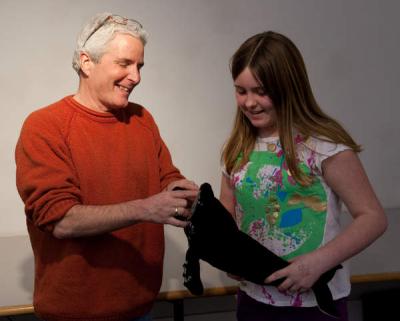Whale expert tells his story at library
He didn't even see the ocean until he was in his early twenties, but biologist David Wiley has become one of the sea's most important advocates, working with fishermen, shipping companies, the Port of Boston and scientists to save critically endangered right whales.
Wiley stopped by the Wareham Free Library on Thursday, Feb. 18, to share the story of how collaboration and small changes can make a large difference in saving some of the world's largest but least understood mammals. The talk was sponsored by the Wareham Land Trust.
Wiley's research looked at whale migration patterns and shipping lanes. He found that, by adjusting shipping lanes a mere 12-degrees northward, ship strikes to endangered right whales will be reduced by as much as 58 percent, and the risks to all large whale species will be reduced by 80 percent or more.
But Wiley's research didn't simply involve collecting and publishing data. A research coordinator with the Stellwagen Bank National Marine Sanctuary off the coasts of Massachusetts and New Hampshire, he wanted to ensure that his data would affect policy.
"I wanted to see how to use research to influence decisions," Wiley said. "What I found was that you have to look at who you're trying to impact with your research and involve them."
So Wiley hopped on trawlers and helped fishermen identify whales. He compared data on whale sightings and shipping paths with the Boston Port Operators each month, and worked with scientists from Woods Hole Oceanographic Institute, the National Marine Fisheries Service, Duke University, the University of New Hampshire and the Whale Research Center in Gloucester to compare data on whale populations. His efforts were recognized by the United States with the Gold Medal award from the Department of Commerce.
"If you want to have people working with you, you have to be interested in working with them," said Wiley. "All [these groups] were part of a large collaborative effort to make this happen."
As an added benefit, these collaborators also shepherded the policy he was promoting through legislative bodies and the United Nations.
"Luckily, I didn't have to do that," Wiley said.













